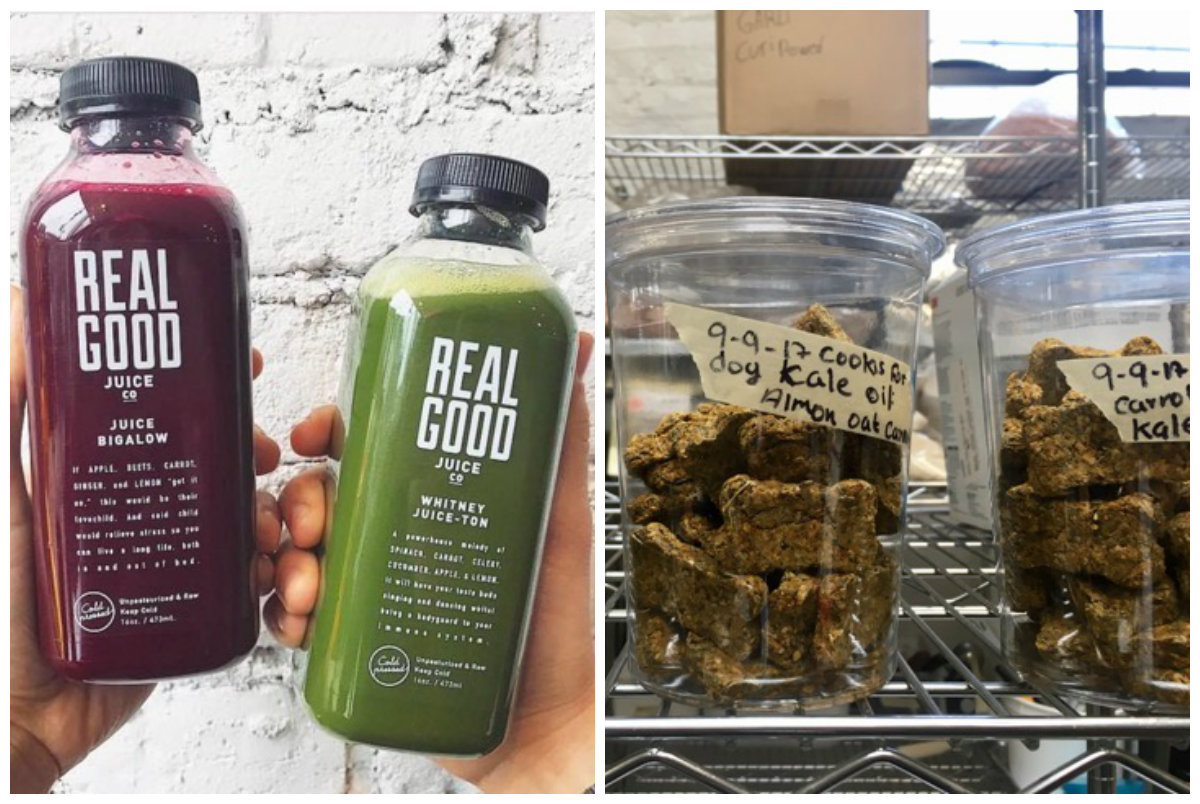The gray garbage bins in the commercial kitchen of Real Good Juice Co. fill up by the hour, but not with garbage. What collects is edible mush, basically, fragrant earth-toned heaps, the remnants of thousands of pounds of raw fruits, vegetables, and nuts.
When Jon Schiff opened his first Real Good Juice shop in Old Town in 2014, he was going through about 300 pounds of produce a week. Today, with three storefronts and juice bars inside nine (soon to be 10) Whole Foods stores, the weekly production numbers—and mush—are up considerably, with some 12,500 pounds of produce yielding 10,000 juices and the persistent question: What the hell to do with all the leftover pulp?
The cold-pressed juice business can be wasteful, however pure the end product might be, which is why Schiff has made it part of the Real Good ethos to prove otherwise. Here, in this kitchen on the second floor of a warehouse in the Kinzie Industrial Corridor, waste-free isn't a buzzword. Making something edible and, more importantly, delicious out of various permutations of pulp and fiber is a daily (and not always successful) endeavor for Schiff and his small culinary team, as evidenced on a recent morning by the cookie-like contents of a container labeled "For John [sic] to try." Which Schiff did try—and didn’t like.
"It's cool because we're learning as we grow," he says. "What we're always trying to do is complete the circle, from the farmer to the bottle to the guest."
A self-described "quintessential foodie," Schiff, 37, finessed his juice bar concept while plotting his exit from a lucrative but unfulfilling career as a hedge fund trader. He wanted to align his interest in healthy, plant-based eating with a desire to support local agriculture. "I reached out to a chef friend and asked him which farm I should volunteer at to understand the local food business," he says. The friend's answer: Spence Farm in Fairbury, Illinois.
Out of that 10-day stint on the farm, Schiff developed his largely Midwest-based network, which in addition to Spence includes Mick Klug Farm, Ellis Family Farms, Nichols Farm and Orchard, Seedling Fruit, and MightyVine.
Produce from these farms trumps organic, though Schiff says he makes concessions when necessary. For instance, the juice bars will switch to organic kale from California in the winter once local kale (one acre a week harvested solely for them) stops coming. "We also do buy conventional. Bananas, avocados, lemons, and non-GMO almonds," he says.
Schiff admits that creative reuse of food scraps wasn't a fully formed piece of his business plan initially. "My first thought was to compost, but I didn't realize the extent of it and I didn't really look beyond that," he says.
He's since determined that composting is viable for a portion of their scraps. The Resource Center does thrice-weekly pickups—nearly a ton and growing at each pickup, says founder Ken Dunn—and converts the material to compost for its City Farm. “We have chickens, and I’m experimenting with short-cycling what we get into food for the chickens. The chickens really love the almonds. And unexpectedly, the cats love the almonds too,” says Dunn.
Leftovers also go to Wheat's End Artisan Foods, a wholesale Ravenswood bakery that makes gluten-free sourdough bread exclusively for Real Good. The bakery is in the process of developing two more gluten-free products at Schiff's request—a colorful wrap for sandwiches using kale, beet, and almond pulp, and "some kind of healthful-minded goodie incorporating almond pulp," says Jacqueline Methling, Wheat's End's co-owner.
As Real Good's expansion continues—a fourth storefront in River North is planned for March 2018 and the 10th Whole Foods location, opening this fall in Birmingham, Michigan, is its first foray out of state—so do Schiff and co.'s kitchen experiments. A line of doggie treats launches next week in Real Good stores.
Leftovers from the juicing process at Real Good Juice Co. are given a second life in these three products. Snack bars, dehydrated fruit, and crackers are also in the test kitchen pipeline, says Schiff.
1. Real Good Ruff dog treats ($3 for 5)
Schiff, a dog lover, named a smoothie on the menu after his rescue pup Sonny Sanderson and has wanted to offer a canine-appropriate snack for a while now. Hearing of the animal rescue efforts in Texas in the wake of Hurricane Harvey was the push he needed to get the treats to market. They're made with spent kale, almonds, oats, and carrots and have been tasted and approved by—who else?—Sonny Sanderson. All proceeds from the sales of Real Good Ruff treats will go to the Houston Humane Society.
2. Coconut jerky ($5.25 for a 1.5-ounce bag)
For the first two years, Real Good staffers cracked open 300 coconuts a day to get at the water inside. That's a lot of coconut meat, which is how the idea for the jerky came about. Real Good now sources organic Thai coconut meat from a company that does the cracking for them.
3. Not Cheese ($6.75 for an 8-ounce container)
One of Real Good's first byproduct-based products, it's made with the nutrient-rich fiber left after almonds, all 1,000 pounds a week, are crushed and squeezed of their “milk.” Schiff and his chefs knew they couldn't throw the stuff out. Mixed with garlic, lime juice, olive oil, salt, and pepper, it becomes soft and ricotta-like. It's dotted over salad bowls, mixed into vegan pesto, and spread as the base layer in the shop's popular avocado toast. Schiff is in talks with a major retailer to have it on shelves this fall.



